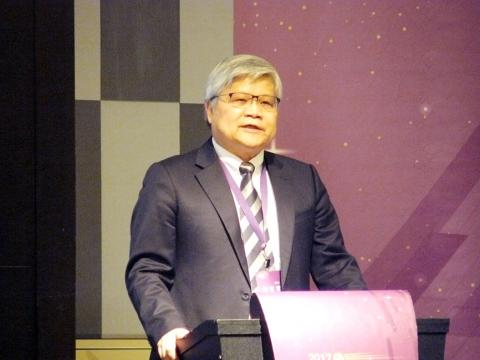Taiwan’s semiconductor industry is bracing for escalating global competition amid rising protectionism and the ascension of China, Taiwan Semiconductor Industry Association (TSIA, 台灣半導體協會) director-general C.C. Wei (魏哲家) said yesterday.
Wei made the remarks during his opening speech at the annual TSIA meeting in Hsinchu.
Wei also serves as cochief executive officer of Taiwan Semiconductor Manufacturing Co (TSMC, 台積電) and is to become the sole chief executive of the chip supplier to Apple Inc in June next year in the company’s latest succession plan.

Photo: CNA
TSIA members are being presented with enormous business opportunities primarily from the nascent adoption of artificial intelligence, which is expected to be widely applied to virtual reality and augmented reality devices, the Internet of Things and self-driving cars, Wei said.
At the same time, local semiconductor companies are facing challenges, he said.
“It is a challenge for Taiwan’s semiconductor industry [to fend off competition from China] as the Chinese government is endeavoring to foster its semiconductor industry,” Wei said. “It is undeniable that China has risen to be the world’s biggest semiconductor market, with more than a 30 percent share.”
Chinese central and local governments fully support its semiconductor companies to enhance their competitiveness and reduce the nation’s dependence on chip imports. China has an ultimate goal of bringing the nation to the center of the worldwide semiconductor industry by 2025.
To address the issue, Taiwanese semiconductor companies should carve out their own technological capabilities, Wei said.
China said it would boost homemade chip supply in the nation to 40 percent by 2020 and to 60 percent by 2025, which is placing greater pressure on the nation’s export-oriented semiconductor firms, chip tester and packager Powertech Technology Inc (力成科技) general manager Hung Chia-yu said.
“Taiwanese chip testers and packagers should consolidate and work together to combat growing competition from Chinese rivals,” Hung said.
Powertech’s combination with Greatek Electronics Inc (超豐電子) has set an example, he added.
Local companies should focus on differentiating themselves from their Chinese peers in terms of their products and technology, he said.
It is also important to better manage customer relations and cultivate talent, he said.
TSIA would continue to act as a bridge between the local semiconductor industry and government agencies to help the government implement practical and beneficial policies for the industry, Wei said.
Stable supply of land, water, electricity and talent are top of the agenda at the discussions, Wei said.

DEMOGRAPHICS: Robotics is the most promising answer to looming labor woes, the long-term care system and national contingency response, an official said Taiwan is to launch a five-year plan to boost the robotics industry in a bid to address labor shortages stemming from a declining and aging population, the Executive Yuan said yesterday. The government approved the initiative, dubbed the Smart Robotics Industry Promotion Plan, via executive order, senior officials told a post-Cabinet meeting news conference in Taipei. Taiwan’s population decline would strain the economy and the nation’s ability to care for vulnerable and elderly people, said Peter Hong (洪樂文), who heads the National Science and Technology Council’s (NSTC) Department of Engineering and Technologies. Projections show that the proportion of Taiwanese 65 or older would

Nvidia Corp yesterday unveiled its new high-speed interconnect technology, NVLink Fusion, with Taiwanese application-specific IC (ASIC) designers Alchip Technologies Ltd (世芯) and MediaTek Inc (聯發科) among the first to adopt the technology to help build semi-custom artificial intelligence (AI) infrastructure for hyperscalers. Nvidia has opened its technology to outside users, as hyperscalers and cloud service providers are building their own cost-effective AI chips, or accelerators, used in AI servers by leveraging ASIC firms’ designing capabilities to reduce their dependence on Nvidia. Previously, NVLink technology was only available for Nvidia’s own AI platform. “NVLink Fusion opens Nvidia’s AI platform and rich ecosystem for

Taiwan Semiconductor Manufacturing Co (TSMC, 台積電) yesterday said it is building nine new advanced wafer manufacturing and packaging factories this year, accelerating its expansion amid strong demand for high-performance computing (HPC) and artificial intelligence (AI) applications. The chipmaker built on average five factories per year from 2021 to last year and three from 2017 to 2020, TSMC vice president of advanced technology and mask engineering T.S. Chang (張宗生) said at the company’s annual technology symposium in Hsinchu City. “We are quickening our pace even faster in 2025. We plan to build nine new factories, including eight wafer fabrication plants and one advanced

‘WORLD’S LOSS’: Taiwan’s exclusion robs the world of the benefits it could get from one of the foremost practitioners of disease prevention and public health, Minister Chiu said Taiwan should be allowed to join the World Health Assembly (WHA) as an irreplaceable contributor to global health and disease prevention efforts, Minister of Foreign Affairs Lin Chia-lung (林佳龍) said yesterday. He made the comment at a news conference in Taipei, hours before a Taiwanese delegation was to depart for Geneva, Switzerland, seeking to meet with foreign representatives for a bilateral meeting on the sidelines of the WHA, the WHO’s annual decisionmaking meeting, which would be held from Monday next week to May 27. As of yesterday, Taiwan had yet to receive an invitation. Taiwan has much to offer to the international community’s